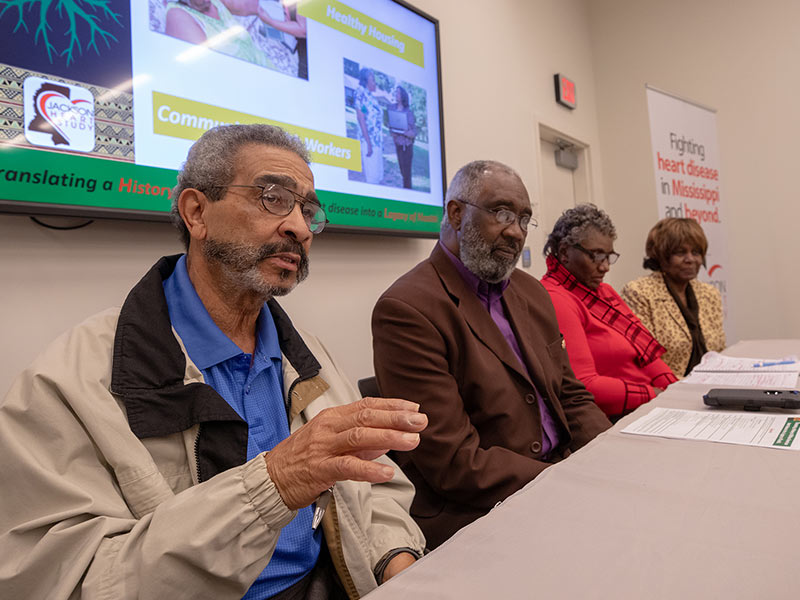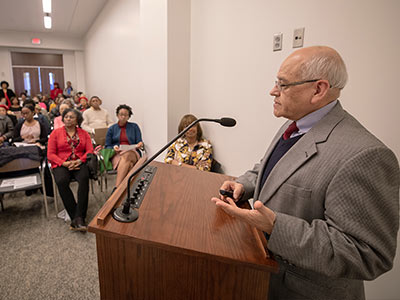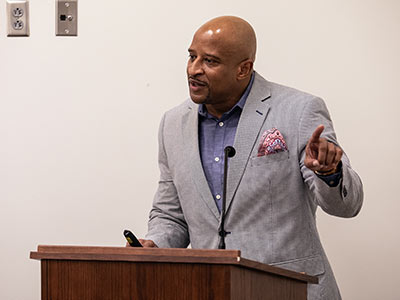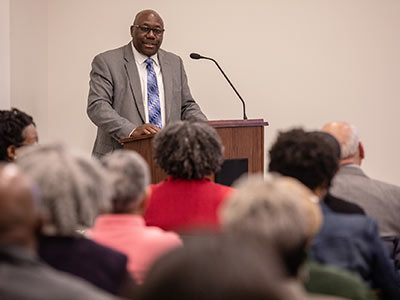Community, training centers add to Jackson Heart Study's mission

February is both Black History Month and American Heart Month. Since 2000, the Jackson Heart Study has worked at the intersection of these topics and continues to drive toward better health outcomes. Now, the study has even more tools to reach its goals.
The Jackson Heart Study is the largest, single-site study of African-American cardiovascular health and risk factors for disease. It has followed 5,300 people from Hinds, Madison and Rankin counties. It is a partnership between these people and four Jackson-area institutions: the University of Mississippi Medical Center, Jackson State University, Tougaloo College, and since 2018, the Mississippi State Department of Health.

When the National, Heart, Lung, and Blood Institute renewed JHS funding last August, it added two new components: a Community Engagement Center led by the MSDH and a Graduate Training and Education Center housed in the John D. Bower School of Population Health at UMMC.
The Mississippi Civil Rights Museum in Jackson was the backdrop for the launch of the CEC on February 16. Leaders from the Jackson Heart Study, its affiliated institutions and study participants gathered to learn about the CEC’s mission and planned initiatives.
“We are really, really excited to be a part of the Jackson Heart Study,” said Dr. Victor Sutton, CEC principal investigator and MSDH director of the Office of Preventive Health and Health Equity.

During this phase of the JHS, Sutton said the CEC plans to form partnerships with barbershops, faith-based organizations, and a mayoral health council to disseminate health information and develop evidence-based approaches to promoting cardiovascular health.
“We want to find out what works and what doesn’t,” Sutton said.
Cardiovascular disease is the leading cause of death in the United States, but African-Americans bear a disproportionate burden. According to the Centers for Disease Control and Prevention, 44 and 48 percent of African-American men and women, respectively, have some form of cardiovascular disease. Understanding why these rates are so high and what can be done to reduce this burden is a primary goal of the JHS.
Dr. Claude Brunson, UMMC Senior Advisor for External Affairs, delivered the launch’s keynote address on the significance of the JHS in the history of African-American health and involvement in research studies.

“We’re painfully aware of the atrocities committed” in the name of research, Brunson told community members. The Tuskegee syphilis study and other unethical experiments contributed to distrust of physicians and medical research. As a result, “African-Americans a less likely to enroll in research studies,” he said.
Because of this history, the most important factor for getting the JHS off the ground was building trust with its community research partners, Brunson said.
“The Jackson Heart Study addressed the trust issue head-on by fully engaging the participants,” he said. “It is now recommitting to bringing this study to the next level, and transforming a history of heart disease into a history of heart health.”
That transformation will not be possible without the next generation of health professionals. The new UMMC GTEC, led by principal investigator Dr. Bettina Beech, joins the centers at Tougaloo and JSU and expands the JHS’s capacity to train students.

“We are very excited about our first cohort of students who will enter the program this summer,” said Beech, dean of the Bower School of Population Health.
The Dr. Robert Smith Graduate Scholars Program is accepting applications through March 1. After a competitive selection process, Beech says eight doctoral or health professional students from Mississippi universities will come to UMMC to learn about cardiovascular disease, epidemiology and health disparities. Students will then use existing data from the JHS or other population-based studies to conduct their own research related to CVD during the two-year program.
“These students will be on our campus for the next two summers and during a mid-year meeting,” she said. “Even though these students will only be on our campus for a short while, they will be able to work with professors at their own institutions as well to complete their research.”
Later in the program, the students will also visit Johns Hopkins University and the National Institutes of Health in Maryland.
“This will be a great opportunity for networking and exposure to cardiovascular-related research opportunities” Beech said.


